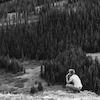February 2, 2015 - 23:59

For my first web-event, I want to use Timothy Morton's introduction to The Ecological Thought as the framework for looking at my notes and musings from these past weeks. The pursuit of belonging to the world, or as Campbell says, “the desire to be at home on the earth,” is deeply tied to the interdependency and mesh of the ecological thought. I have also recognized this deep desire in myself, and I want to explore how this dual sense of belonging and being lost is perhaps inherent in thinking ecologically. These two senses, feeling lost and feeling found, lay in my own confusion about thinking (and feeling) ecologically, yet simultaneously taking part in social structures which often divert from this way of thinking and living. I feel deeply connected and humbled when thinking the ecological thought, in the way that critically reexamines what I do, how I relate to other beings, and how I live.
I want to explore this dichotomy in my own life through looking various representations of “ecological thinking” and deep time that we have encountered in class thus far. From Keith Morris Washington's rural landscapes of violence to Rachel Sussman's evolving catalogue of ancient life, these projects interrogate essential moral and conceptual frameworks we act from. In these projects, context changes everything: I analyzed the surface-level aesthetic qualities of “James Sanders, Roadside Field” until I gained the image's historical context; I would have looked at Sussman's images of ancient microbial mats with a different view having not known their age. How can my experiences with thinking the ecological thought transform my life? How might creative representation and contemplation help unblock certain ways of thinking?
